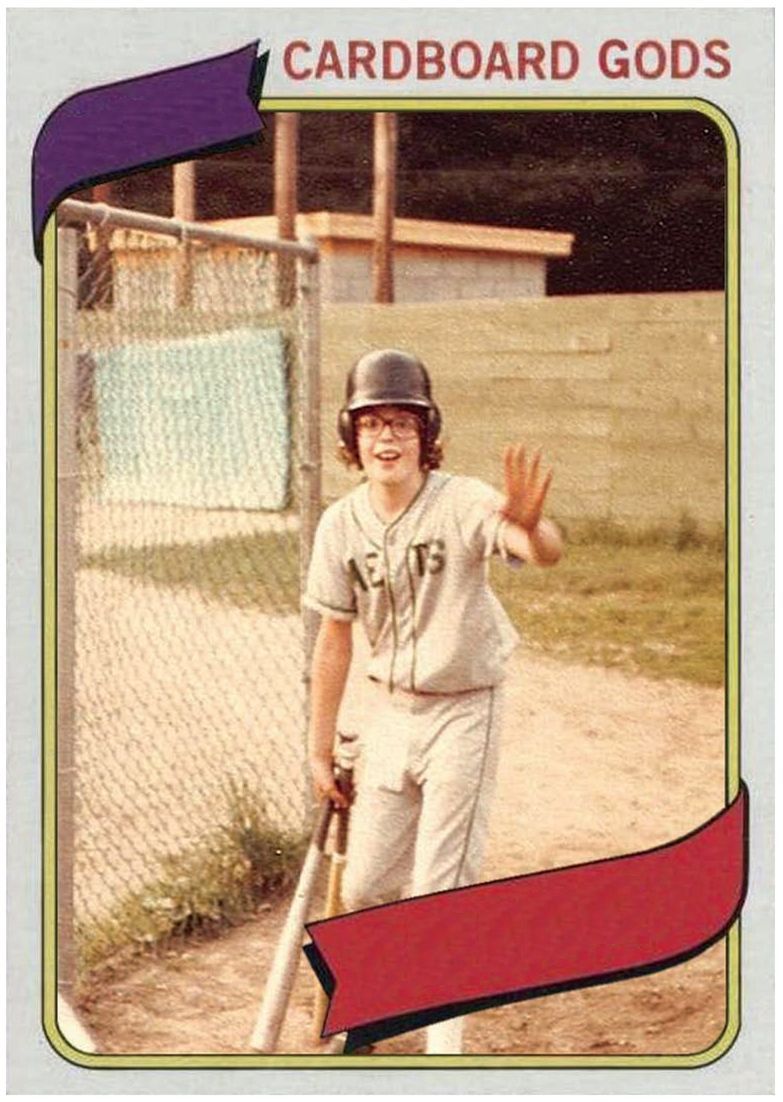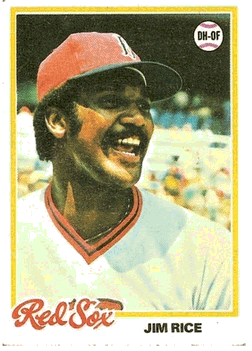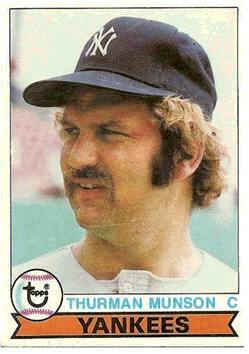Cardboard Gods (16 page)
Authors: Josh Wilker

But to digress for a moment for something completely unrelated to that one-game playoff between the Yankees and the Red Sox in 1978, here's the tragic figure of Bucky Dent, the mildly promising, light-hitting young Chicago White Sox shortstop who after being named to the Topps All-Star Rookie Team in 1975 was killed in a horrific wood-chipper accident.
Some are of the opinion that this accident is a myth, and that Bucky Dent actually went on to play for several more years in the American League, and that in one notable instance he even distinguished himself as the power-hitting hero of a certain one-game playoff, that he strode to the plate in the seventh inning of that contest with two men on and his team, the Yankees, down two runs and, after fouling a pitch from Red Sox starter Mike Torrez off his foot and delaying the game for several minutes as trainers tended to the bruise, finally got back into the batter's box, now armed with a dubious new bat that teammate Mickey Rivers had, like a cardsharp producing a new deck from a hidden pocket just before going for the kill, suspiciously rushed into Bucky Dent's hands, and with this new bat Bucky Dent swung with the entirety of his scrawny might at Torrez's next offering and managed with the help of God, if you believe in God and in the idea that God has the time and inclination to micromanage wind patterns, lifted the ball just barely over the Green Monster for what stands, in this version of reality (which carries as an appendix the notion that Bucky Dent's resultant fame allowed him to be featured in a beefcake pinup poster favored by adoring brace-faced prepubescent girls from
Riverdale to Smithtown), as arguably the most famous blow ever struck in the entire storied rivalry of the Yankees and Red Sox.
Riverdale to Smithtown), as arguably the most famous blow ever struck in the entire storied rivalry of the Yankees and Red Sox.
All of this is preposterous, akin to the crackpot notion that the moon landings were staged on a lot in Burbank or that all Jews got a memo on September 11 to avoid downtown Manhattan. A legendary home run? Please. Beyond the contradictory indicators of Bucky Dent's slight frame and complete lack of power-hitting skillsâfactors which could, it is true, have been compensated for by a perfect storm of: 1) a nice fat pitch across the center of the plate; 2) an unlikely but not impossible instance of optimally solid contact; 3) the closest left-field wall in major league baseball; 4) a powerful wind gust lifting up toward heaven and out toward the Massachusetts Turnpike; and 5) possibly some corkâconsider that this is the only Bucky Dent card in my entire collection, and if he had indeed played beyond this year the only way to explain his absence from my collection would be to say that I assiduously removed and destroyed any later Bucky Dent cards, as if for some reason the very sight of them caused me revulsion. But why on earth would anyone waste time doing something like that?
Clearly, the stronger Bucky Dent theory is the one in which Bucky Dent was tragically chopped into pieces, then minced into bits, then pureed into a mush of flesh and feathered hair and eye black by a ravenous, extremely efficient wood chipper before he was ever able to make any significant impact on baseball history or on the innocence of, say, a ten-year-old Red Sox fan in East Randolph, Vermont, on October 2, 1978.
3rd PACK
HALO


In the bottom of the ninth on October 2, 1978, the Red Sox had the tying run on second and the winning run on first and only one out and Jim Rice coming up. Jim Rice had already had one of the best years of all time. In fact, he'd crushed more pitches in one season than anyone in decades, as evidenced by his 406 total bases, the most in the majors since Stan Musial's 429 in 1948. All he had to do was crush one more. But he got a little under a Goose Gossage heater and flied out to right. The runner on second, Rick Burleson, moved to third. Ninety feet away. One chance left.
Yaz.
By this point my brother and I were both standing, crowding the television as if it were the faltering fire in an igloo.
“Come on, Yaz,” Ian said.
“Come on, Yaz, please,” I said.
Â
It was a long winter. I continued to check the mailbox for a reply to my 1976 letter to Yaz, even when I had to trudge through waist-high snow to do it. I continued to see Yankees third baseman Graig Nettles in foul territory, the ball in his glove, both arms upraised.
Â
In the spring I went on a school trip to Boston. We were outside the cramped Fenway Park player parking area, and I saw Jim Rice get out of a car. I pressed my face against the chain-link fence that separated us. He was no more than twenty feet away.
“Jim Ed!” I shouted.
He turned toward me. I was too shocked to say anything. After all my years of worship, I couldn't believe a god could hear me, that a god could look me straight in the eye. Moreover, I sensed that there was in Jim Rice's quick, almost flinching, squint-eyed glance toward the caller of his name a suggestion that he was haunted by a nervous, even paranoid unease with the world around him. This may have contributed to my silence as well, the possibility that Jim Rice not only was able to hear us mortals but was mortal himself. I could not think of a single thing to say. Words had been uninvented. I gulped air. Jim Rice turned away.
Life got more complicated after that. The school trip to Boston occurred during my last days of elementary school. It had been decided that even though I was only the equivalent of a fifth grader, it was time for me to leave the hippie-invented class with no grades. After several years in a classroom where everyone was free to be whatever they wanted to be, I had become a sarcastic know-it-all, undercutting most attempts by the teacher to lead the class in any constructive direction by voicing such brilliant remarks as “Great idea, teach,” and “Oh boy, we've never done
that
a million times before.” It was too much. I was told that in the fall I would no longer be welcome in the class and instead would have to jump into seventh grade, junior high, that different kind of school altogether, a giant building where my brother had started to change, to grow taller and tougher and quieter and further away from me.
that
a million times before.” It was too much. I was told that in the fall I would no longer be welcome in the class and instead would have to jump into seventh grade, junior high, that different kind of school altogether, a giant building where my brother had started to change, to grow taller and tougher and quieter and further away from me.
On the ride home from Boston to Vermont, I sat with two other boys and three girls in the roofed back of a pickup truck and refused to participate in a game of Truth or Dare that mostly amounted to taking turns kissing. I could not kiss a girl. I don't know why I was so terrified, but I was. (In fact, it would be many long years before, with the help of grain alcohol, I kissed a girl, a bleary coed majoring in hotel and hospitality management.) The amazing thing was that my terror at being kissed actually drove the three girls in the back of the truck crazy. By the time we were almost home all three of them were feeding off one another on the subject of me like I was the latest disposable fad, like Shaun Cassidy or Pop Rocks or the “invisible dog” leash.
“Go with me, Josh,” one of them said. I didn't understand this request. Go?
“No, go with me!” another one pleaded.
“Go with all of us,” the third one squealed.
This third one was the prettiest, and she would lose interest by the next day. The second prettiest would move back to her solemn all-consuming infatuation with George Harrison within a week. The third, a burly, freckled, pug-nosed girl, kept after me the longest, cornering me periodically like she was going to steal my lunch money, but even she got tired of my stammering deer-in-the-headlights routine, finally saying, “What is
wrong
with you?” and storming away. I was relieved at first, but then I missed her; I'd never be popular again. That night in the back of the truck, returning from Boston, was, for me, like when some minor league call-up has a game, one game, when he slugs the ball all over the yard like Jim Rice. Except as it was happening all I wanted was for it to end.
wrong
with you?” and storming away. I was relieved at first, but then I missed her; I'd never be popular again. That night in the back of the truck, returning from Boston, was, for me, like when some minor league call-up has a game, one game, when he slugs the ball all over the yard like Jim Rice. Except as it was happening all I wanted was for it to end.
“Please go with us, Josh!” all three girls said, crowding me. “Please, please, please!”
Go?
I kept screaming to myself.
Go where?
Topps 1979 #310: Thurman MunsonI kept screaming to myself.
Go where?

I didn't want to go anywhere. I didn't want anything to change. I didn't want time to move. But it moved. Summer came. I tried to stop time the best way I knew how, with baseball cards.
This 1979 Thurman Munson card is one of the cards that came to me that year. By that time, finding a Yankee in a pack of cards had long been like finding a mold-blackened orange in your trick-or-treat bag. I valued the never realized (nor even approached) goal of completing the year's collection too much to throw the offending cardboard in the garbage, as I would the orange, but I tried to get the Yankees cards away from the others as soon as possible and out of sight so I could engage in my time-dissolving card-aided daydreams without the sharp sliver of festering resentment in my nostrils.
Some of the cards were less offensive than others, the mushroom-cloud hair of Oscar Gamble, the innocuousness of Roy White, the hilarious storytelling ability of the author of
The Bronx Zoo
, Sparky Lyle, and the mere name of Mickey Klutts among the few effective truce-making offerings from the world of my enemies. On the other hand, some Yankees were capable of tainting the whole pack, including perennial asshole-of-the-year Reggie Jackson, simian brawl-instigator Lou Piniella, the bat-corking duo of maimer of Bill Lee's shoulder Graig Nettles and sucker puncher Mickey Rivers, and a certain weak-hitting pretty-boy shortstop who may or may not have been slowly, oh-so-painfully killed in a wood-chipper accident.
The Bronx Zoo
, Sparky Lyle, and the mere name of Mickey Klutts among the few effective truce-making offerings from the world of my enemies. On the other hand, some Yankees were capable of tainting the whole pack, including perennial asshole-of-the-year Reggie Jackson, simian brawl-instigator Lou Piniella, the bat-corking duo of maimer of Bill Lee's shoulder Graig Nettles and sucker puncher Mickey Rivers, and a certain weak-hitting pretty-boy shortstop who may or may not have been slowly, oh-so-painfully killed in a wood-chipper accident.
I counted Thurman Munson in that latter group. Yankees captain, leader of the bullies, picker of fights with Carlton Fisk. And here he was again, befouling my pack with his little squinting smile. This
smile was probably interpreted by me as connoting that the Yankees had just won another title. Since I'd been living and dying with baseball, the Yankees had won a pennant in 1976, a World Series in 1977, and another World Series in 1978. And when I tried to escape the seemingly endless ongoing tyranny in the present by diving into the baseball encyclopedia, I saw more of the same, stretching back as far as the eye could bear to see.
smile was probably interpreted by me as connoting that the Yankees had just won another title. Since I'd been living and dying with baseball, the Yankees had won a pennant in 1976, a World Series in 1977, and another World Series in 1978. And when I tried to escape the seemingly endless ongoing tyranny in the present by diving into the baseball encyclopedia, I saw more of the same, stretching back as far as the eye could bear to see.
Fucking Yankees,
I thought.
I thought.
Â
In early August of 1979 we took our yearly bus trip to see our dad. It was unusually crowded, so I couldn't sit with my brother and had to take a seat with a short, mustachioed guy in his early twenties. We started talking and he told me he was a Yankees fan, and he reminded me a little of Thurman Munson, Yankees captain, leader of the bullies, picker of fights with Carlton Fisk. Despite that, I didn't hate him, and he was friendly, and time flew as we talked about baseball through the first few hours of the ride, before the midtrip fifteen-minute break in Springfield, MA. During that break, everybody got off the bus. I don't know where the guy sitting next to me went, but my brother and I wandered through the station and came upon a vending machine that we hadn't noticed before on any of our previous stops in Springfield.
Other books
Deborah Goes to Dover by Beaton, M.C.
Invoking Darkness by Babylon 5
The Double Life of Incorporate Things (Magic Most Foul) by Hieber, Leanna
A Field Guide to Awkward Silences by Alexandra Petri
Dear Crossing by Doering, Marjorie
Ghosts - 05 by Mark Dawson
The Looking Glass Wars by Frank Beddor
Prince's Fire by Amy Raby
Classic (Adrenaline Book 1) by Neal, Xavier
The Innocent Liar by Elizabeth Finn